- Home
- Fay Weldon
Worst Fears Page 6
Worst Fears Read online
Page 6
Ned’s books on the shelves; a letter in Ned’s handwriting on the board above the table. Dated two years ago. “Dear Jenny—thanks for the Rosmersholm pics. Brilliant as usual. Talk to you soon. In haste, Ned.” And two crosses for kisses beneath the familiar signature. Well, what was wrong with that? Ned always put two crosses for kisses, for friends. Or was it one? She herself got three. Jesus, was she in competition here.
On the table was a cheque for £200 signed “Vilna Mansell.” It lay there as if no attention had been paid to it at all. It was dated last Sunday. Well, someone sometimes told the truth. Vilna too was barking mad, but at least had the excuse of war back home, and saw herself as Alexandra’s friend, to the value of a couple of hundred pounds. She was troubled.
Alexandra stared at the photographs some more. She thought she herself had taken the one of Ned putting up the bean poles. That had been in May. Three months ago. She’d taken the roll to Boots the chemist to be developed. Most people did the same. If Jenny had an arrangement with someone at Boots she could siphon off any number of photos of Ned. Just ask her to look out for them; have another copy made. Alexandra observed that Jenny had burned away her half of a snapshot of the two of them, herself and Ned down at Kimmeridge Bay, where the fossils lurked in the flaky slate cliffs. Abbie had taken that. They’d all gone down in the car. Three years ago. Had they met Jenny Linden and her husband there, accidentally? Shared the contents of the Lindens’ thermos of coffee? She seemed to have some such memory. Dave Linden, that was his name. Had Sascha been in that snapshot too? Alexandra thought so. The burn marks ran up the side of Ned’s sleeve.
All I have here, thought Alexandra, is evidence of a woman obsessed by my husband. A plain, mad, unhappy woman. I should feel sorry for her.
Alexandra went upstairs to Jenny Linden’s tiny bedroom. A white coverlet on the unmade bed; lots of cushions and pillows tossed everywhere, black lace knickers on the floor, trimmed with crimson. Black and crimson—well, she’d worn that too in her time. Vulgar and fun. Just odd for Jenny Linden. But perhaps she lived in hope. Women did. A fossilised ammonite on the wooden mantelpiece. You could find them in the ground round here. They were excavating part of the prison to build their Penitentiary Theme Park. All kinds of things turned up in the disturbed soil. Roman pottery. Stone Age axeheads. Fossils. Presumably once sea had covered the land here: presumably Jenny Linden kept her eyes open. Finding fossils was the kind of thing that Ned approved of.
Still the quiver in the air as if the wails had just stopped. A painting of Ned on the wall: no, not a painting. A kind of montage of scraps of fabric which amounted to a portrait; very much Jenny’s style. A model of a set on the dressing table: on closer inspection a model of Ned and Alexandra’s bedroom. That was shocking. The oak table made in matches; the brass bed contrived in orange sticks and minute slivers of twisted gold paper. A doll’s house mirror where her, Alexandra’s, mirror was. How did Jenny know what her bedroom looked like? Because she’d been to a party at The Cottage in the past? Might even have come to an event or so when Alexandra had been in town? Ned sometimes asked people round? If the spare room was occupied, guests would leave their coats in the master bedroom. Or because when Ned and Alexandra were both away Jenny Linden came in and loitered, and breathed up her beloved’s breath? A fan, a true fan, a devotee, a groupie, a stupid, plain, fat middle-aged woman well beyond her sell-by date, a stalker into sympathetic magic.
Alexandra went into the bathroom and found Ned’s toothbrush in the tooth mug. That is to say it was yellow and had a blue line running through the tufts. When the blue line was no longer visible it was time to buy a new toothbrush. It was barely visible. Perhaps Abbie had thrown it out on the Sunday morning? Perhaps Jenny had then stolen it? Perhaps she welcomed this dreadful intimacy—that she should put in her own mouth what had been in Ned’s?
Alexandra took the toothbrush. She took all the photographs of Ned off the wall. She took the address book and the diary. She let out the orange cat, who stalked away calmly up the road. And she drove home to the unbearable emptiness of The Cottage. She would not have to put up with it for long. Hamish would be arriving mid-afternoon.
There were eight messages on the answerphone. One from the Mail on Sunday, another from The Times asking for help with Ned’s obituary, another from Dr. Moebius asking her to return his latest call, one weeping woman too incoherent to identify, one from the florist asking her where exactly The Cottage was, and another one, which Ned had picked up: Ned saying, “Is that you, Leah? Hang on a minute, I’ll switch off the bloody answerphone.” At least she thought he said that. She replayed it. It was an old call. The tape was on its second time around. Trying to find it again, she erased the message by accident. But she thought he’d said that. Perhaps he’d said “dear”? Soon she would be as mad as Jenny Linden.
Alexandra felt completely excluded, cut out, burned away. Ned’s image was owned by others, as was his voice: it spoke to others, not to her. Even his body, his skull, had been snatched by others. Were they sawing through it at this moment? Did bones leave sawdust behind? Did brains spill out as they did in horror stories? Diamond snuffled round her ankles. She made a fire in the grate. She burned the photographs because Ned’s image had been besmirched by Jenny’s regard. She burned the toothbrush because it might have been in Jenny’s mouth and had become disgusting. She lay it on a firelighter, applied a match, and watched it splutter and flare. She watched Ned disappearing in green and purple and black. But he still didn’t feel gone. If she turned round he’d be smiling at her. Like the smile of the Cheshire Cat, remaining long after the body had gone.
If Jenny had been less sludge-like, had been a prettier, younger, cleverer person, Alexandra would not feel so shop-soiled, so picked over. Jenny was like a garment in a rummage-sale: infinitely dreary. Grief should be pure and noble.
There were noises from upstairs. This time it truly was Diamond, on the brass bed again. She went up; heaved him off. Had there been a dog curled up and mutinous in the model in Jenny’s bedroom? She had a feeling there had been, but no longer trusted either her memory or her senses. Everything was virtual. Diamond wasn’t allowed on the bed anyway. She thought perhaps she should tell the police about Jenny Linden’s obsession. Everyone knew these things could be dangerous. But now she, Alexandra, had stolen things from Jenny’s house. Not the photographs, not the toothbrush—they were hers, if anyone’s—but diary and address book. Why had she taken them anyway? She was being dragged into a situation it would be better to ignore. She was exhausted again. She lay down on the brass bed and slept. She was woken by the phone.
“MUMMY,” SAID SASCHA, IN his piercing urgent voice, “the cat’s got kittens. I have to go.” He went. Irene took the phone.
“Darling,” she said, “I hope you’re not too upset. Men will be men; that is to say, babies.”
“Why should I be upset?” asked Alexandra. “In particular? Apart from being widowed; all that?”
“You have heard of the Doctrine of Parsimony?” asked Irene.
“No,” said Alexandra. “Couldn’t we talk about the cat having kittens? How many?”
“Eight,” said Irene. “But where did I go wrong in your education?”
“You sent me to stage school,” said Alexandra.
“The Doctrine of Parsimony is a version of Occam’s razor,” said Irene, who had been to Cheltenham Ladies’ College in its severe prime and then to Oxford. “Both suggest that the simplest solution is likely to be the true one; or the most useful. If, as you say, there is a mad woman roaming the edges of Ned’s life—”
“His death—” said Alexandra.
“—it is likely that Ned gave her some encouragement. Think of Fatal Attraction.”
“But she’s so fat and horrid,” said Alexandra.
“You mean why should Ned be interested in her while he had you?”
“Exactly,” said Alexandra. “Besides, we loved each other. He wouldn’t do anything like that. He had
a great integrity. He didn’t cheapen himself, ever.”
“That’s as may be, but you’ve been away an awful lot,” said Irene. “Men don’t like it. If the wife leaves an empty bed a husband’s first impulse is to fill it.”
“I’ve been working,” said Alexandra. “What was I supposed to do? It’s not my fault if I’ve had to earn. Ned got me the part in the first place. Do you think I’ve liked being away from home? We couldn’t even have Sascha’s fourth birthday on the proper day because I had a matinee. And the poor little boy hated coming up to London at weekends…he missed all his friends’ parties, but what could we do? And then Ned died on the dining room floor, just fell down and died, and I wasn’t even there.” She cried.
“Stop blubbing,” said Irene, who’d always wanted to go on the stage but had been thwarted, or so she said, by an early marriage and Alexandra’s birth. “You owe it to your public not to blubber. You’ll spoil your looks. And it upsets me. I feel so helpless. I don’t like leaving you alone. Likewise, I don’t want to bring Sascha back to The Cottage, into such an unhappy house as it must be at the moment.”
“But I miss him,” wept Alexandra.
“Stop thinking about yourself,” said Irene. “I’ll keep Sascha with me until after the funeral, and that’s that. It’s the best thing. And when is the funeral? Why is nobody saying? Is it going to be a cremation? Really they’re the best, except there’s always a problem about the ashes.”
“I don’t know, I don’t know,” wailed Alexandra. “I can’t bear to think about it. Hamish is going to see to all that.”
“You’re the widow,” said Irene. “You really ought to take some responsibility.”
“You’ve had so much practice, I suppose,” said Alexandra, bitterly. “You know all about it.”
“Actually,” said Irene, who had indeed buried two husbands out of four, one of them Alexandra’s father, “I do.”
“Was our house full of whispers when my father died? And rustlings, and movements out of the corner of your eyes? Things you thought you almost saw, but didn’t really. It’s got so spooky here.”
“It was perfectly quiet and ordinary,” said Irene. “I made sure he died in hospital. But when our cat Marmalade passed away it was just as you describe until she was safely underground. Sascha made a little tombstone in the garden. I expect he told you about that. No? I’d keep seeing Marmalade on the stairs, but when I looked again she wasn’t there.
As I was going up the stair,
I met a cat who wasn’t there,
She wasn’t there again today,
I wish to God she’d go away.
The eyes play tricks. These are Marmalade’s eight grandchildren we’ve just had. I suppose you don’t want one for comfort? No? Probably wise. You’re never in one place long enough. The sooner Ned is buried the better. Or burned. As for this Jenny Linden, be careful. People like that can be dangerous. If Ned was God what does that make you?”
“Mary?”
“No, darling, the devil. In this Jenny Linden’s eyes. Do be careful! Wasn’t there a Jenny Linden in A Doll’s House?”
“Christine Linde,” said Alexandra. “She plays the doleful widow, a woman who has to earn her own living. Daisy Longriff was playing her—and understudying me. Now Daisy’s playing me, and they’ve got a girl out of wardrobe to do Mrs. Linde. Her big chance.”
“That’s a bit spooky,” said Irene. Then she had to go because her current husband wanted her to find one of his golf shoes which the puppy had no doubt run off with, and Sascha had tried to put one of the kittens in the dryer. Alexandra, usually so independent, missed her mother and whimpered.
Alexandra put Mozart’s Greatest Hits on the CD player, very loud. That dispersed a fear or so but added to her melancholy. She put Jenny’s diary and address book in a drawer amongst Ned’s papers—then she took them out: there was too much intimacy there—and put them on an open bookcase, where they touched nothing important. She would turn her mind to them when she felt like it. She stored it up in her mind as a kind of treat. Having them in her possession increased her control over the situation. She felt empowered, as would a witch who had just stolen the clippings from her enemy’s toenails.
Dr. Moebius called. Ned’s body would be back in Mr. Lightfoot’s morgue during the course of the afternoon. He hoped Alexandra did not take his insistence on a full autopsy as unfeeling. It was important that the forensic labs didn’t cut corners.
“Only skulls and breastbones,” said Alexandra.
The cause of death was myocardial infarction; there was no sign of cerebral haemorrhage. Would Mrs. Ludd like some sleeping pills? He seemed to have forgotten about the herbal tea.
“What brought the heart attack on?” asked Alexandra. “So suddenly, and without warning?”
“These things just happen,” said Dr. Moebius. “Or there may have been some undue excitement.”
“Like someone coming to the door you didn’t want to see?” suggested Alexandra.
“Possibly,” said Dr. Moebius. And he told her that someone you didn’t want to see might well increase the heartbeat, and a simple increase could indeed be enough to trigger an infarction. She should think of the many middle-aged men who died when getting up to make an after-dinner speech; or in the middle of sexual congress. He asked when the funeral was, and said he would do his best to get there. Ned had been a charming man, and an excellent patient. That is to say, he seldom came to the surgery. It might have been better if he had come. His blood pressure might have been high for years but no one would know now.
Alexandra said the day of the funeral had not yet been decided.
“Don’t leave it too long,” said Dr. Moebius. “An overnight stay at a morgue can cost as much as a five-star hotel. Am I being too practical? I’m sorry.”
“That’s okay,” said Alexandra.
Dr. Moebius asked when Alexandra was going back to work. She said a week today. He was shocked and said she’d need more time than that—and wasn’t there the child to think about? Alexandra said too much thought might be counter-productive: she did not know yet what her financial position was going to be: time off for widowhood might prove an impossible luxury. “Surely—” said Dr. Moebius.
“Surelys went out the windows years back,” said Alexandra. “These days we all do what we have to, not what it would be nice to do if we could.” She asked if Jenny Linden had been in the house when he was called in on the Sunday morning, and Dr. Moebius said that was so, apparently she’d turned up to walk the dog and found Ned dead—”
“Abbie found him dead,” said Alexandra.
“Oh yes, of course,” said Dr. Moebius. “The one who runs the language school. She was there as well. She’s very careful, very responsible. But Mrs. Linden was particularly distressed and made quite a nuisance of herself.” He’d given her a sedative and she’d left. If Mrs. Ludd happened to see her, would she ask Mrs. Linden to drop by to see him? She might find herself suffering from post-traumatic stress disorder.
“Why should she?” asked Alexandra. “She’s not exactly family. Just an acquaintance.”
“She’s very sensitive,” said Dr. Moebius. “We are not all made of stone.” Meaning I am? wondered Alexandra, detecting censure in his voice. She told herself not to be paranoic. Dr. Moebius said he had to make an emergency visit to the language school and brought the conversation to an end.
Alexandra called Abbie and told her she’d broken into Jenny’s home and how she’d found a shrine to Ned there, and how eerie it was. Abbie said she thought Alexandra had gone mad doing such a thing, but she, Abbie, couldn’t come now because the doctor had given the student an injection earlier, and the lad was now reacting to that far worse than to the suspected wasp sting, which had probably never happened, and she’d had to ask the doctor to visit yet again. Should she ask Vilna to go over to The Cottage, if Alexandra was upset?
“No,” said Alexandra. “I’m just fine, thank you.” Then she asked Abbie if i
n Abbie’s opinion Ned and Jenny had ever had an affair. Abbie shrieked down the phone and said, “Why should Ned look at anyone else when he had you?”
“He looked at Vilna,” said Alexandra, “according to Vilna.”
“Vilna’s like that,” said Abbie. “Hopelessly Balkan. She thinks every man’s a sexual vampire. Take no notice. What does it matter anyway, Alexandra? Ned’s dead. Over. Don’t these things fade into perspective?”
“Actually no,” said Alexandra. “They don’t seem to. Since I can’t discuss the matter with Ned, or ever have any explanation from him, let alone excuses, or any resolution to do better in future or any apology, and since there is no way more recent times could ever push back past times into irrelevancy, why then no forgiveness is possible. I can’t play both sides of the argument on this matter, speaking for him as well as for me. It isn’t possible.”
“I don’t see why not,” said Abbie. “If Arthur can play three-dimensional chess with himself, you can forgive a husband posthumously for a trivial and stupid affair—”
“You mean there was one?” Alexandra was quick.
“I mean nothing of the sort,” said Abbie. “I swear on the cross that to the best of my knowledge and belief nothing untoward happened between Ned and that little bitch Jenny.”
“On the cross?” demanded Alexandra.
“I thought you were a Buddhist.” But she laughed. Then she said, “Did Ned ever say anything to you about seeing a therapist called Leah?”
“Of course not,” said Abbie. “If he didn’t tell you why would he tell me?”
“You mean he was?”

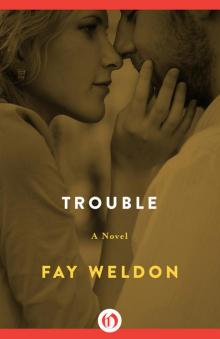 Trouble
Trouble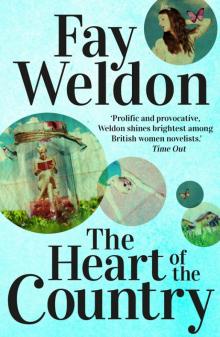 The Heart of the Country
The Heart of the Country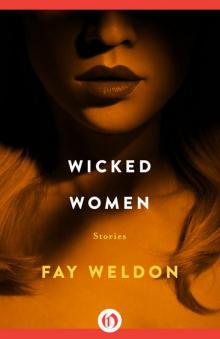 Wicked Women
Wicked Women Mischief
Mischief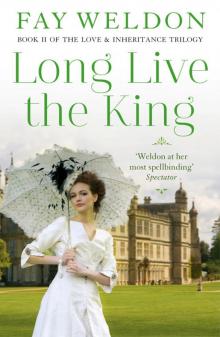 Long Live the King
Long Live the King Remember Me
Remember Me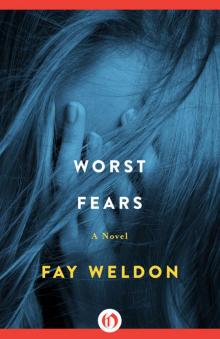 Worst Fears
Worst Fears Chalcot Crescent
Chalcot Crescent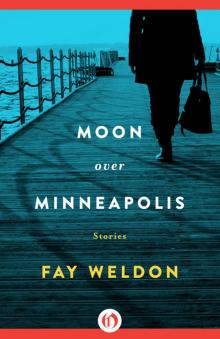 Moon Over Minneapolis
Moon Over Minneapolis The New Countess
The New Countess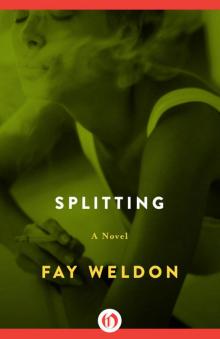 Splitting
Splitting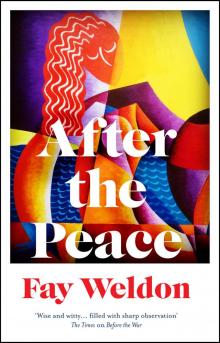 After the Peace
After the Peace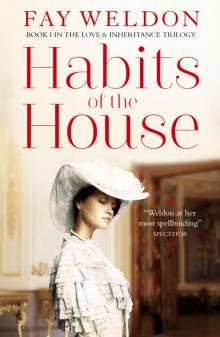 Habits of the House
Habits of the House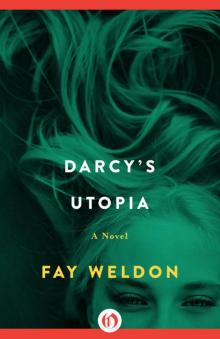 Darcy's Utopia
Darcy's Utopia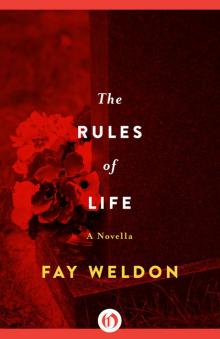 The Rules of Life
The Rules of Life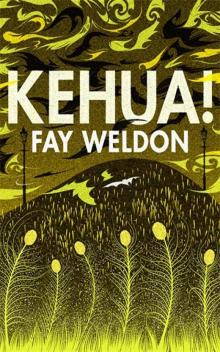 Kehua!
Kehua! Before the War
Before the War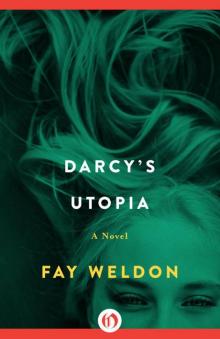 Darcy's Utopia: A Novel
Darcy's Utopia: A Novel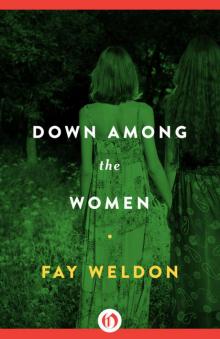 Down Among the Women
Down Among the Women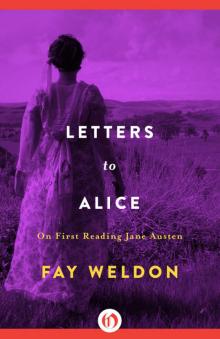 Letters to Alice
Letters to Alice 3 Great Historical Novels
3 Great Historical Novels Female Friends
Female Friends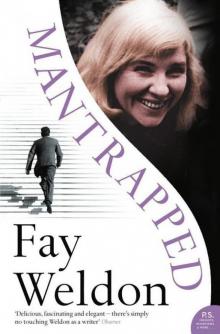 Mantrapped
Mantrapped The Bulgari Connection
The Bulgari Connection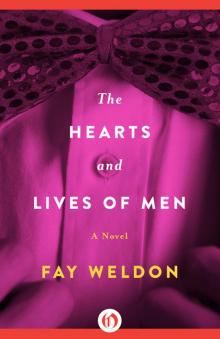 The Hearts and Lives of Men
The Hearts and Lives of Men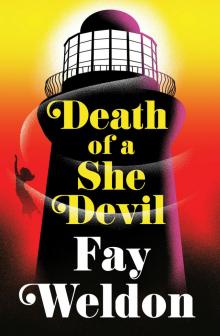 Death of a She Devil
Death of a She Devil